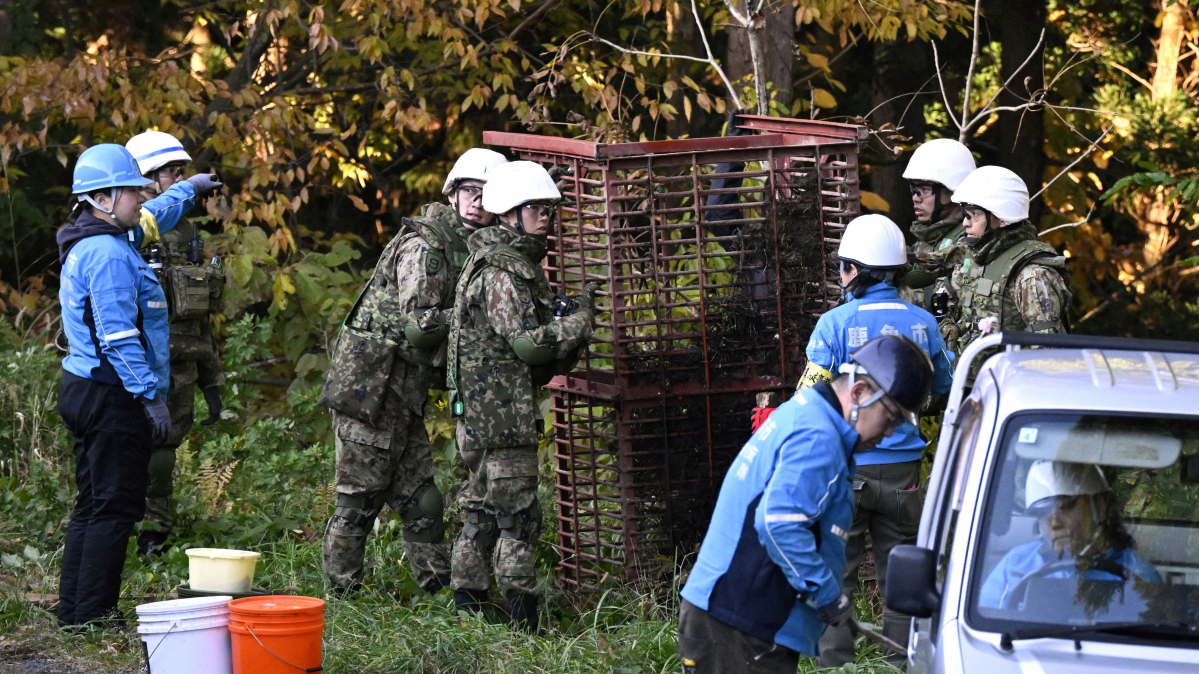Munich Security Conference panel sees Middle Corridor as peace catalyst
Senior officials from Azerbaijan, the European Union and China used the stage at the Munich Security Conference to promote the Trans-Caspian Internati...

Japan has dispatched troops to its remote northern regions to help capture bears after local authorities reported that communities were struggling with a surge in attacks.
The Self-Defence Forces (SDF) began operations in Kazuno, a mountain town that has witnessed an alarming rise in bear encounters. For weeks, residents have been warned to avoid wooded areas and remain indoors after dark as hungry bears forage near homes.
“Even if temporary, the SDF’s support is a great comfort,” said Yasuhiro Kitakata, head of the town’s bear control division.
“I used to think bears would flee from noise — now they come towards it. They are truly terrifying creatures,” he added.
Since April, Japan has recorded more than 100 bear attacks, with 12 fatalities — the highest on record — according to the Ministry of the Environment. Akita prefecture, home to Kazuno, and neighbouring Iwate account for two-thirds of the deaths. Authorities in Akita say sightings have risen sixfold this year to more than 8,000, prompting the governor to request military assistance.
“The townspeople live with fear every day,” said Kazuno Mayor Shinji Sasamoto, after greeting about 15 soldiers who arrived in trucks and jeeps equipped with body armour and maps.
“People have stopped going out and are cancelling community events,” Sasamoto added.
The troops will help transport and set up steel-barred traps used to capture bears before trained hunters cull them.
On a nearby mountain road, forestry officials trained soldiers to assemble and load the traps, while armed troops stand guard with bear spray, shields, and long wooden poles resembling rifles used in drills.
One local woman, who declined to give her name, said she came out thinking there was a fire.
“We all try to avoid bears, but we keep hearing about more attacks,” she said, her radio blaring to deter wildlife.
Kazuno, a town of about 30,000 known for its hot springs and sweet apples, is the first of several areas where the troops will operate until the end of November, before moving on to Odate and Kitaakita.
Rising danger and environmental shifts
Experts say increasing bear numbers, climate change affecting food sources, and rural depopulation are bringing humans and bears into closer contact. An ageing population of hunters once responsible for managing wildlife can no longer keep up.
Recent incidents include bears attacking shoppers inside a supermarket, mauling a worker at a hot spring resort, and injuring a tourist near a UNESCO World Heritage site. Several schools have temporarily closed after bears were seen near playgrounds.
Bear encounters typically peak in October and November as the animals fatten up before hibernation.
“Last year’s food abundance led to more cubs being born. This year, their food has run out,” said Kitakata.
Japanese black bears weigh up to 130 kg, while brown bears in Hokkaido can reach 400 kg. Japan has previously used troops for wildlife control, such as deer hunts a decade ago and sea lion culls in the 1960s.
Deputy Chief Cabinet Secretary Kei Sato said Tokyo will soon announce emergency measures, including recruiting more licensed hunters. The government has already eased firearm restrictions to allow bear hunting in urban areas.
“With bears entering populated regions and attacks rising daily, we simply cannot afford to delay countermeasures,” Sato said.
Europe heads into the Munich Security Conference, on Friday (13 February), amid deepening unease over U.S. policy, as President Donald Trump’s hard-line stance on defence, trade and territory fuels doubts about Washington’s long-term commitment to transatlantic security.
American figure skating star Ilia Malinin endured a dramatic collapse in the men’s free skate on Friday night, falling twice and tumbling out of medal contention at the Milan Cortina Winter Olympics as Kazakhstan’s Mikhail Shaidorov surged to a surprise gold medal.
“Respected and feared globally,” U.S. President Donald Trump told troops at Fort Bragg on Friday (13 February), framing America’s renewed strength against to mounting pressure on Iran amid stalled nuclear talks.
Dubai-based global ports operator DP World said on Friday that its long-serving chairman and chief executive, Sultan Ahmed Bin Sulayem, has stepped down following mounting pressure linked to alleged ties to disgraced financier Jeffrey Epstein.
Speaking at Munich Security Conference, Ukrainian foreign minister Andrii Sybiha calls for decisive steps ahead of expected Geneva talks
Senior officials from Azerbaijan, the European Union and China used the stage at the Munich Security Conference to promote the Trans-Caspian International Transport Route, or Middle Corridor, as a fast-growing trade artery and a potential anchor of regional stability.
Britain, France, Germany, Sweden and the Netherlands said on Saturday (14 February) they are convinced that late Kremlin critic Alexei Navalny was poisoned with a lethal toxin in a Russian penal colony two years ago.
The U.S. Department of Homeland Security (DHS) has partially shut down after Congress failed to reach agreement on immigration enforcement changes, deepening a political standoff between the White House and Senate Democrats.
Israeli army chief Eyal Zamir said on Friday (13 February) that Israel remains committed to the complete demilitarization of the Gaza Strip and the disarmament of Hamas, calling for intensified operations to destroy tunnel networks and control access along the ceasefire line.
“Real security guarantees are needed before the war ends,” Ukrainian President Volodymyr Zelenskyy said at the Munich Security Conference on Saturday (14 February), warning that Russian aggression shows no sign of relenting.
You can download the AnewZ application from Play Store and the App Store.

What is your opinion on this topic?
Leave the first comment